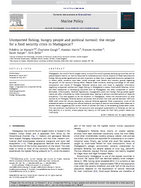Abstract
Madagascar, the world’s fourth largest island, is one of the world’s poorest developing countries, and its people depend heavily on marine resources for subsistence and income. Exports of these resources and foreign fishing access agreements are also important, at least from a large-scale economic perspective. In recent years, concerns have been voiced amongst local fishers and industry groups regarding the growth of the country’s fishing effort. Despite these concerns, existing knowledge of the scale, composition and trends of Malagasy fisheries remains poor, and there is negligible information regarding unreported catches and illegal fishing in Madagascar’s waters. Small-scale fisheries, which are often substantial in developing countries such as Madagascar, are often unreported or underestimated. Unfortunately, fisheries legislations, management plans and foreign fishing access agreements are often influenced by these incomplete data, leading to serious over-estimations of resource availability. This also appears to be the situation in Madagascar, where the reconstruction of total catches by all Malagasy fisheries sectors conducted here showed that total catches between 1950 and 2008 were twice the volume reported by national fisheries agencies. Most importantly, much of the subsistence sector is missing from official statistics, and signs of decline have already been observed in several stocks, suggesting that current levels of catches are likely to be exceeding sustainable yields. This has profound implications for the economic and ecological sustainability of fisheries, as well as food security in a country where people rely heavily on the ocean for their daily protein needs and livelihoods.

















